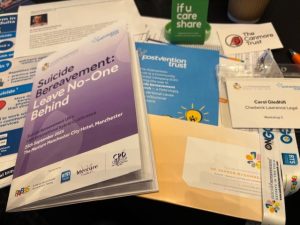
On 25 September I attended the Suicide Bereavement Conference in Manchester. I am a qualified suicide first aider and I wanted to enhance my skills. I hope I never need to use my skills in suicide first aid but want to be as confident as I possibly can be in case such a situation arises.
The main things I will take away from the conference are:
1. The language used around suicide. It is not appropriate to say "committed". This is a historic term used when suicide was considered to be a crime. it is more appropriate to say that someone has died by suicide or has suicide ideation.
2. Asking someone if they are suicidal does not trigger them to attempt suicide. It is better to be direct and then supportive rather than change the subject. If someone is sharing that they have suicide ideation with you then they are trusting you a great deal.
3. The suicide rates in autistic people are higher. This can be for many reasons, for example, communication issues and not knowing how to express their thoughts and feelings.
4. One of the speakers talked about the higher rates of suicide in menopausal women. There are 32 symptoms of menopause including anxiety, brain fog and memory loss. There is a lack of support and information around using HRT and how it can make things worse for some women.
5. Suicide in the prison system. It doesn't just affect prisoners, it affects prison staff. We heard anonymously the lived experience of what happens in prison when someone dies by suicide.
6. Victims/survivors of domestic abuse are also at a higher risk as some may feel like it's the only way out and can't access support because the situation they are in.
A death by suicide causes a ripple where the death is at the centre but the ripples expand across a vast area affecting many people from the people closest to them to the person who may have discovered them or the person who is called to the scene, friends, colleagues, the list goes on and has an effect on the lives of so many people either directly or indirectly. It is estimated that over 150 people can be affected by one suicide death.
All the speakers showed incredible courage to stand up and speak about their loss and experience of suicide with great dedication to try and make a difference, save lives and 'leave no-one behind'.
